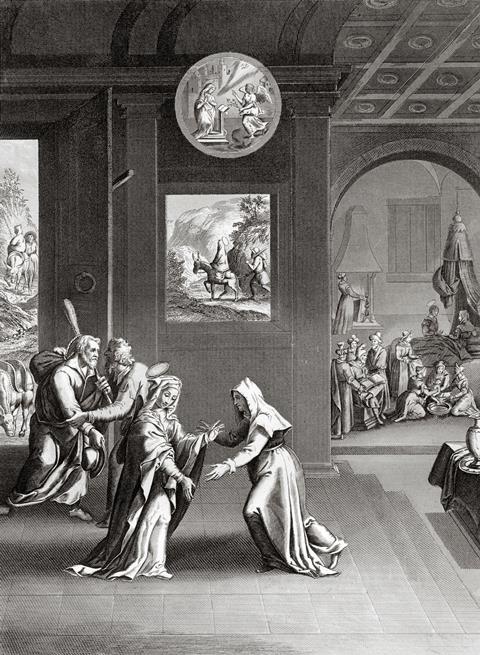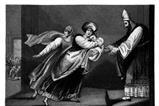Elaine Storkey unpacks the time cousins Mary and Elizabeth spent together while pregnant, showing us the importance of being ‘home’ for one another
Study passages: Luke 1, focusing on verses 39-40
I wonder how often you’ve had the ‘home from home’ experience. For some of us it’s quite common, as we think of home as being several places – the place we live in, the house we grew up in where perhaps our parents still live, or the home of a sibling or old friend whom we visit regularly. Sometimes, the experience can take us by surprise, such as when we accept the hospitality of someone new and find ourselves engulfed in the sense of being completely at home in their presence and surroundings.
Luke narrates a wonderfully authentic story about two cousins sharing this experience. At one level there is nothing unusual about cousins feeling at home with one another. You might know that first hand. During my own early childhood, I was very close to one cousin. We lived in the same street, shared each other’s homes and frequently slept in the same bed. We were not sisters but had that ‘one-remove’ that cousins enjoy – knowing the comforting family bond that can grow deeper over the years. Cousins often have a strong emotional link, and that was especially true of the two women in Luke’s story.
Rooted to one another
Many features in Luke’s story stand out for me. The cousins were both Jewish in an extended family line, but they also had some significant differences. One was young and had no husband; the other was old and had no children. What brought them together was that they were now both unexpectedly pregnant, and that pregnancy was likely to affect their immediate status in different ways. For the older cousin it was be elevating; for the younger one it would be a mark of shame. The two women needed to be at home together so they could know the prayerful support and security from each other during this key time in their lives.
The importance of home was very much a feature of the Jewish culture. The allocation of land, the requirements of hospitality, the provisions for the alien and the stranger were all woven into the way God asked the Israelites to live. The relationship with home echoes throughout the Hebrew scriptures. Sometimes in the biblical narrative, God called people to a nomadic existence where they had no permanent abiding place but became a home to each other. Sometimes, as with Naomi and Ruth, they returned home from afar because of bereavement. Sometimes the Israelites experienced deep alienation when taken from their homes into exile. Yet God’s call to be homeless was never to be rootless. It was always a call to encourage one another in hospitality and faith and put down deeper roots in God.
In Luke’s story, Mary had to leave home with all its familiar trappings to be at home with her older cousin, who was by now six months into pregnancy. Elizabeth needed her in the sudden change of her life and status. The journey must have given Mary time to reflect. She herself was betrothed but not married to Joseph and, since they’d had no sexual relations, he would know very soon that she was carrying a child which was not his. The likely outcome for a woman pregnant out of wedlock, was that she would be rejected by her fiancé and by the entire culture around her. Mary knew her baby was God’s Son but however could that be conveyed to Joseph? Luke does not dwell on this – it is Matthew’s Gospel which tells us that God arranged for Joseph to be reassured in a dream encounter with an angel. He was told to marry Mary with confidence and simply take her home (Matthew 1:19-21).
The cousins were called to be home for each other
Elizabeth meanwhile, received the news of Mary’s visit with great joy. She herself needed someone to be at home with as she had stayed in seclusion for the last five months. For years before that she had felt diminished as a woman; a disappointment to the family. The hallmark of a successful female in that culture was to produce a quiver full of children for her proud husband. Not only had Elizabeth’s own status suffered through childlessness, but so had her husband Zacharias’ and she was by now well past childbearing age. Luke subtly points all this out in his text when he tells us twice that she was called the ‘barren’ woman (vv7, 36, ESV) a cruel, constant reminder that she was a ‘failure’. But Elizabeth knew things were about to change. The past few months had taught her that what God promised was really going to happen. Her aged womb had become a safe home for a tiny, growing foetus. And she had given this little lodger all the hospitality her elderly body could muster. Mary’s welcome visit provided the rich opportunity to let the truth of it all soak in.
The cousins were called to be home for each other because both women recognised the miracle involved in their pregnancy. They were each carrying a child who would bring the good news of salvation and God’s kingdom. One child was to be the herald of the other, preparing God’s way on earth. The other was the Saviour himself. And as cousin Mary arrived at Elizabeth’s house, it became evident that the two women were not the only ones who knew that. From the moment he heard Mary’s voice, Elizabeth’s baby leapt in her womb. This seemed so significant to Luke that he mentioned it twice – in both his narrative and in the inspired words uttered by Elizabeth (vv41, 44). Even yet unborn, this child knew already that he was in the presence of the Lord, to whom his life would be given in service. And in that second, Elizabeth saw the hospitality she was giving to her cousin as utterly overshadowed by Mary’s hospitality in coming to her. Her cry “ why am I so favoured, that the mother of my Lord should come to me?” came with clarity from the Holy Spirit, who now poured into the home, drawing the women together. As each cousin prophesied and gave praise and thanks to God, Elizabeth and Mary were deeply at home to each other and to the children they carried. More than that, they were also at home to God’s Spirit of blessing and truth.

How does this story relate to us today?
It isn’t possible to unpack the depth of this story in a few words, for Luke’s narrative offers us many insights. It resonates with spiritual truths on issues as varied as obedience, God’s power, faith and trust, family, worship, spiritual gifts and hearing God. So, I want to stay with our theme of ‘home’, and see how this story highlights its significance.
Home is important because it represents so much that is vital in our human lives. We begin being at home in the womb, as Mary and Elizabeth found, especially in that spectacular disclosure. The kindness and hospitality we receive there sets us up for our childhood home with parents or those who nurture us. We can’t underestimate the importance of early home experience. Much of our personal identity and our secure sense of self comes from our childhood context and from those who made it our own special place. Home helps shape our identity, so we know who we are. Carmelite nun Sister Elizabeth Ruth Obbard once suggested that a person who is ‘at home’ in the place of her childhood is ‘at home’ anywhere.
Leaving home is inevitably challenging, even if, as for Mary, it’s for a short time. We leave behind the familiar, the people and places that give us security, and reach out to those that are new. Going away sometimes feels like cutting ourselves off from roots that go long and deep. Emotionally, this is no easier today even though we can cross continents in less time than it took Mary to go from Galilee to the hill country of Judea. We leave behind precious people with whom we’ve shared our lives so far and sometimes whom we never see again. We can only do it if home stays embedded within us.
Yet travelling away is even more difficult if we have never had a home to go from. Mary had the security of her rootedness in Nazareth and people to leave behind. Too many people today grow up knowing no real home, or without one which grounds them in love. Tragically, low self-esteem, fear, anxiety, inability to accept the love of others can stem from difficulties in early childhood experiences. Those who’ve never been shown their true value can spend a lifetime looking for home.
Ultimately, being ‘at home’ is to be who we are. For believers, it is to know our identity and rootedness in Christ and receive God’s love. And when the Holy Spirit takes up home in our lives, we become ever more able to reach out with the love and hospitality that makes us home for other people.

































No comments yet